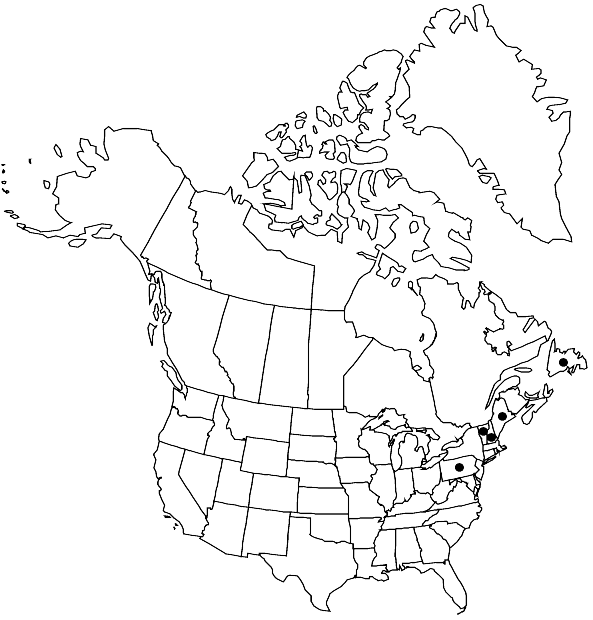Sphagnum mcqueenii
Sida 22: 959, figs. 1–6. 2006,.
Plants robust and weak-stemmed; yellow to light-brown; capitulum flattopped and with ± conspicuous terminal bud. Stems light green; superficial cortex of 1–2 layers of moderately differentiated thin-walled cells. Stem-leaves equilateral triangular, 0.8–1.1 mm; often spreading; apex more or less obtuse; leaves often spreading; hyaline cells usually septate and often fibrillose in proximal half of leaf. Branches unranked, ± straight, leaves moderately elongated at distal end. Branch fascicles with 2 spreading and 1–2 pendent branches. Branch stems green, with cortex enlarged with conspicuous retort cells. Branch leaves ovatelanceolate, less than 2.2 mm, straight; undulate and sharply recurved when dry; margins entire; hyaline cells on convex surface with 0–1 apical pores and often with pseudopores, concave surface with to 12 round wall-thinnings in cell angles and sometimes along commissures; chlorophyllous cells triangular in transverse-section, just enclosed on the concave surface and broadly exposed on the convex surface. Sexual condition unknown. Spores not seen.
Habitat: Habitat poorly understood, but known from floating mats in poor fen habitats
Elevation: low to moderate elevations
Distribution

Nfld. and Labr. (Nfld.), Maine, N.H., Pa., Vt.
Discussion
Sporophytes of Sphagnum mcqueenii are unknown. Sphagnum torreyanum and S. atlanticum both have longer, narrower, and less sharply recurved branch leaves than does S. mcqueenii. Both S. cuspidatum and S. viride have acute stem leaves as compared to the obtuse stem leaves of this species. Sphagnum pulchrum has 5-ranked branch leaves and apiculate stem leaves, which contrast strongly with the unranked branch leaves and obtuse stem leaves of this species.
Selected References
None.
Lower Taxa
"elongated" is not a number.